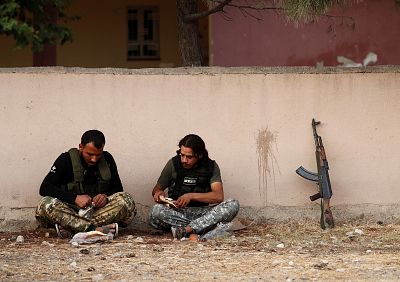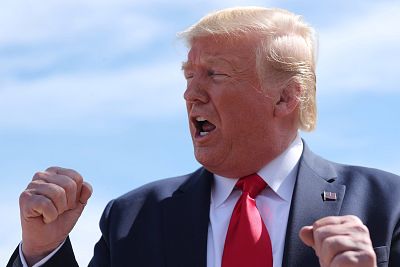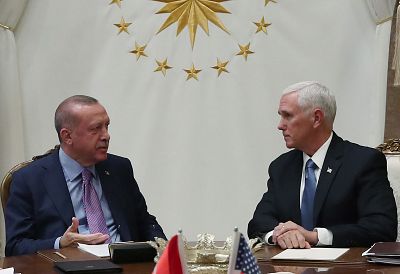Analysis: The Trump administration's deal with Turkey is being framed in foreign policy circles as a capitulation to Ankara and a further gift for Damascus and Moscow.
LONDON — President Donald Trump presented Thursday's U.S.-brokered deal with Turkey — which despite sporadic gunfire has paused fighting in northeast Syria — as "a great day for civilization."
But in foreign policy circles it is being widely framed as a capitulation to Turkish President Recep Tayyip Erdogan and a further gift to Syria's Bashar al-Assad and Russian President Vladimir Putin.
The Trump administration, aftera whirlwind visit to Ankara by Vice President Mike Pence and Secretary of State Mike Pompeo, appeared to have handed Erdogan an emphatic victory by agreeing to his so-called safe-zone — a demilitarized area along Syria's border where Turkey wants refugees to live and which has been a longstanding Erdogan objective.
The implications for America's standing on the world stage remain unclear but the blow to its reputation as a power that defends its allies is likely to be significant.
"It is capitulation, it's that simple," said Fawaz Gerges, a professor of Middle Eastern politics at the London School of Economics. "Trump may celebrate this as the deal of the century, but it reaffirms the humiliation of the Trump administration and its betrayal of the Kurds, its loyal allies."
"He's emasculated U.S. foreign policy," he added.
Trump's decision to withdraw U.S. troops from northeastern Syria and to move out of the way of a Turkish invasion on Oct. 9 has been met with sustained bipartisan criticism at home.
Download the NBC News app for breaking news and politics
His uncertainty on the issue may have made things worse. On Wednesday, he claimed the conflict was over land that "has nothing to do with us," distancing the U.S. from Middle East affairs. He was taking American soldiers out of a dangerous region, he said.
But on Thursday, Trump was claiming credit for the agreement and recasting the U.S. as a major powerbroker in the region.
"Everybody agreed to things that three days ago they would have never agreed to," he told reporters. "That includes the Kurds. The Kurds are now much more inclined to do what has to be done. Turkey is much more inclined to do what has to be done."
Then during a campaign rally in Texas on Thursday night, Trump said that "sometimes you have to let them fight, like two kids in a lot, you got to let them fight and then you pull them apart."
The 13-point U.S.-Turkey agreement gives Kurdish forces, who have been crucial allies in the U.S. fight against ISIS, five days to withdraw from Erdogan's declared safe zone.
The agreement stipulates that when Kurdish forces have withdrawn from the area the Turks will halt their operation — but it does not mention any obligation for Turkey to withdraw its troops. After the offensive is halted, U.S. sanctions imposed on Turkey will be lifted, it adds, meaning there appears to be no penalty for Erdogan's weeklong offensive.
It is unclear what Ankara has conceded, if anything, as part of the deal, which appears to allow Turkey to achieve its military aims in the region without having to fight.
'This is not a cease-fire'
It was unclear Friday whether the U.S. had even achieved what it said it had.
The Turkish-U.S. deal does not refer once to a "cease-fire," instead referring to a pause in Operation Peace Spring. Turkey's Foreign Minister Mevlut Cavusoglu also declined to use the word on Thursday.
"This is not a cease-fire, cease-fires can be done only between two legitimate sides," he said, according to a Reuters translation.
Furthermore, while the hope is that the agreement will save lives in the coming days, there is little confidence that the pause in fighting will hold.
"I can't remember a time when any ceasefire [in Syria] was truly adhered to ... and implemented with any genuine intention," said Michael Stephens, a research fellow at the Royal United Services Institute, a London-based think tank.
And Bashar Assad indicated Friday that he was not ready to put down his arms.
In a meeting with Iraq's national security adviser in Damascus, the Syrian president said his country would respond to a Turkish aggression on any part of its territory with "all legitimate means" available, Syrian state media reported.
'The Kurds have been thrown under the bus'
The deal represents another blow to the Syrian Kurds' ambitions of greater self-determination.
The size of the "safe zone" is unspecified but it carves into Syrian territory and into a region where Syrian Kurds had established self-rule.
"The Kurds have been thrown under the bus," Gerges said. "It is a greater, bigger abandonment than the previous one."
The deal says that Turkey "expressed its commitment to ensure safety and well-being of residents of all population centers in the safe zone controlled by the Turkish forces."
But tens of thousands of people have been forced to leavetheir homes in the first week of the Turkish invasion according to the U.N. TheSyrian Observatory for Human Rights, a monitoring group based in Britain, puts the figure at around 300,000.
Trump even appeared to endorse the Turkish aim of ridding the Syrian side of the border of Kurdish fighters, whom Turkey deems to be terrorists but who fought against ISIS on behalf of the U.S.
"They had to have it cleaned out," he said Thursday.
"President Erdogan and President Trump buried the hatchet, they buried the hatchet right in the back of the Kurds," former NATO Supreme Allied Commander James Stavridis told NBC's "Today" show on Friday. "This is approaching ethnic cleansing."
It is not just Turkey that looks set to gain from Thursday's agreement. A five-day pause in fighting could allow Assad to move his forces into position, buying him time. And the center of influence in the region has shifted from Washington to Moscow.
"I now see Moscow and Sochi as the Mecca for Middle Eastern rulers," Gerges said.
"Erdogan's trip to Sochi on Tuesday will likely determine the future of northeast Syrian rather than the so-called cease-fire deal signed by Pence and Erdogan," he added.














